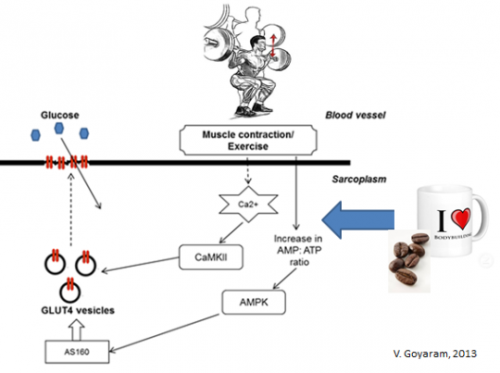Caffeine is a real deal mental and physical performance booster and is definitely one of the most health friendly compounds gifted to us by mother nature. I like caffeine so much that if I have to choose 5 supplements, caffeine will definitely feature among them. My day starts not with my protein fix or a trip to the toilet but a trip to the kitchen for my coffee. When willing to talk to girls, my favourite ice breaker is “Hey let’s go for coffee!”.
This article series will deal with key aspects of caffeine consumption and sports and exercise performance. We all know about the effect of caffeine in exercise performance but in this article we will look at a little known benefit of caffeine consumption: muscle recovery.
Caffeine promotes muscle glycogen resynthesis after glycogen depleting workouts
Glycogen is the storage form of carbohydrate in muscles. This glycogen is the preferred source of energy for muscle contractions in bodybuilding workouts. Therefore, after training it is imperative to kickstart the glycogen replenishment process. I have received a few questions about why I consume strong coffee with my postworkout meal (Fig. 1) rather than before, because caffeine is supposed to be a preworkout booster. Well, there are quite recent studies that have shown that the consumption of caffeine in addition to carbohydrates post workout leads to a higher rate of glycogen replenishment than with carbohydrate alone. This highlights the potential value of caffeine as a recovery agent in addition to its role as an energy booster.
Researchers from RMIT University in Melbourne, Australia, led by Professor John Hawley (who earned his PhD from my research unit in South Africa) carried out investigations on this effect of caffeine. They found that caffeine ingested along with carbohydrates postworkout led to 66% more muscle glycogen than carbohydrate alone. The researchers suggested that this caffeine effect may be due to a greater rate of glucose absorption by muscle cells. Therefore, they set out to analyse the effect of caffeine on the intracellular processes that are normally responsible for glucose uptake under exercise.
Two key molecules that are involved in this process are the enzymes CaMKII and AMPK. These become active as a result of muscle contraction during exercise. Their activation triggers processes in cells that bring about the movement of glucose transporters (GLUT4) to the surface of muscle cells for glucose uptake (See Fig. 2). A greater rate of glucose uptake may lead to increased glycogen resynthesis because glucose uptake is a limiting process in glycogen resynthesis. Interestingly, the researchers found that caffeine + carbs intake after exercise leads to a greater level of CaMKII activation than what is normally experienced by carbs only. This may indicate a greater rate of GLUT4 activation, glucose uptake and glycogen resynthesis.
Although not investigated by the above study, the activation of the CaMKII (and AMPK) enzymes also increases the synthesis of GLUT4 so that there are more of these transporters available to take up glucose. The link between CaMKII activation and increased GLUT4 levels has been extensively reviewed in an article that I co-authored with my professor in the American Journal of Physiology, Endocrinology and Metabolism last year (Ojuka EO, Goyaram V and Smith JA, 2012). My research group from the University of Cape Town has also extensively studied caffeine in glucose uptake at the molecular level, under the leadership of Professor Edward Ojuka.
Practical application and important considerations
Caffeine dosage and intake protocols: The Australian study above has used a high amount of caffeine (8 mg per kg of bodyweight) but smaller doses are also under investigation as well as the effect of taking caffeine before, during and after training (vs. caffeine taken only after). I speculate that smaller doses and spreading the caffeine intake around workouts may also work.
Other considerations: proceed with caution if you have any known sensitivity to caffeine and stimulant products, high blood pressure or any cardiovascular complications. It is best to check with your medical doctor before taking caffeine-containing products including pre-workouts. Some people may experience sleeplessness and feel jittery after a caffeine megadose while others may not experience any such things. That is why researchers are investigating lower doses of caffeine. The potential side effects of caffeine will be discussed in future articles.
by Vic Veeraj Goyaram (africanmuscle)



2 comments
Hi!, nice topic.. as i am a coffe maniac myself and workout too.. is there a problem to show me the articles you make reference?
Thanks a lot!
Rodrigo
Pingback: Louis Vuitton Outlet